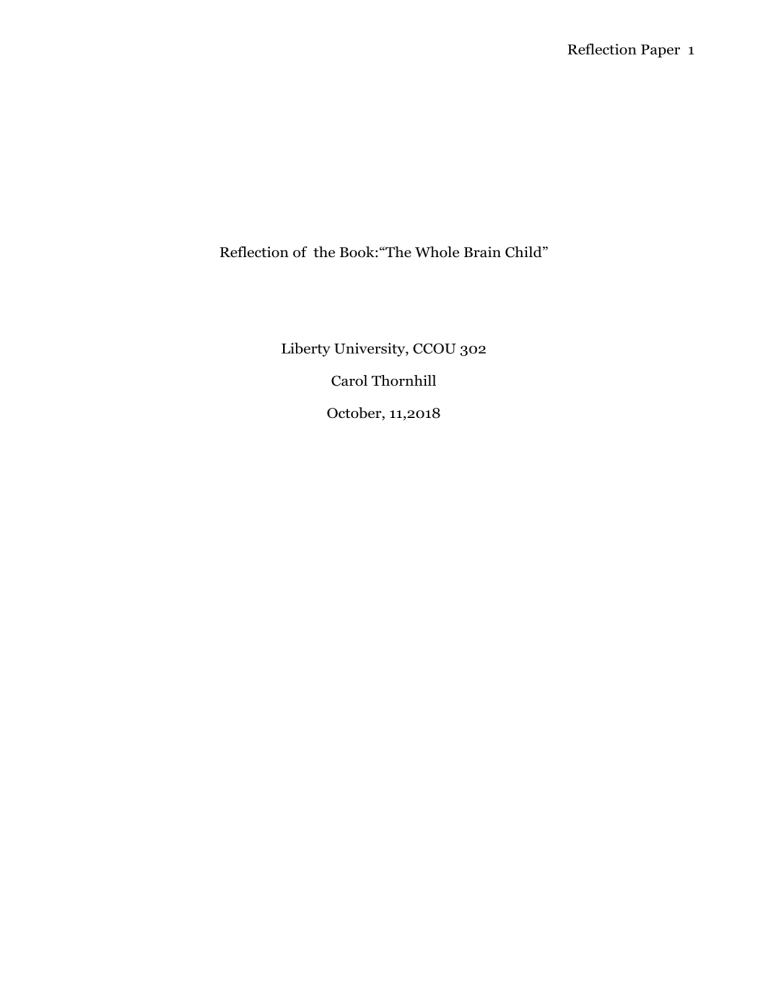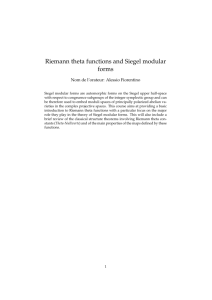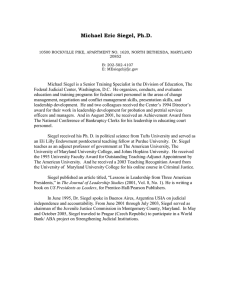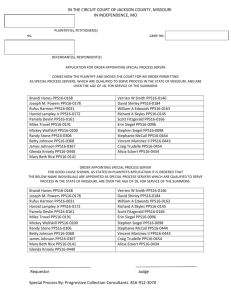
Reflection Paper 1 Reflection of the Book:“The Whole Brain Child” Liberty University, CCOU 302 Carol Thornhill October, 11,2018 The Whole Brain Child “The Whole Brain Child,” written by Daniel Siegel and Tina Payne Bryson. When you first read the title of this book, you wonder what this book could be. Is it about teaching your child to stop and think? Is it about children who are smarter? Is it about behavioral issues and the brain? Surprising this book is more for parents and how to parent your children by using their whole brain. Parents learning about the brain, how it functions, and how to engage their child’s whole brain to benefit them in life and relationships. “Our ultimate goal is to raise kids in a way that lets them thrive. You want them to enjoy meaningful relationships, be caring and compassionate, and do well in school, work hard and be responsible and feel good about who they are,” states Siegel and Bryson. Siegel, 2011, pg. 6)The point is as parents our hearts should be to raise children to live lives that do not repeat negative, painful patterns but to thrive in life so that their lives can glorify Jesus Christ. Often as parents, we survive each day and each situation that occurs without thinking about how everything you say, or do can impact the well-being of your child. A fantastic and encouraging truth is revealed in the first page of this book, “the moments you are just trying to survive are opportunities to help your child thrive.”(Siegel, 2011, pg. 6) The goal is to take the situations and trials we experience with our children and use them as learning moments to grow their minds and hearts. Not just grow their minds in a general sense, but all the way to the neurons of their brain. The purpose is to make connections between the left and right side of the brain, and upstairs and downstairs part of the brain, which is referred to as integration, so as they grow they learn to use their whole brains in various situations. “The brain physically changes through the course of our lives…. What molds our brain? Experiences” states Siegel and Bryson. Integration can help parents transform the way they think about parenting and take the experience they have with the child and transform them and mold their brains. (Paraphrased Siegel, 2011, pg. 8) Learning about integration and the different functions of the brain, allows parents to have an understanding of why their children act the way they do. It helps parents to learn how to help them to change the way they operate or even think so they can function better in life and respond better in life situations. As a counselor, I would help a child understand the hub/ wheel concept which is a concept on “understanding our minds” (Siegel, 2011, pg. 19) to help them deal with their fears, frustrations, and emotions. I would then strive to connect with the child to guide them to redirect their thoughts and feelings. I hope to help the child think of the trial they are experiencing differently and if it involves another person to try to see the situations from the other person’s perspective. I would try to get them to connect the downstairs part of the brain(emotions part) to the upstairs section (logic part) of their brain so they can reason and learn from the trial they are experiencing. In reading this book, it brought clarity to how and why children react to situations, and why their emotions become out of control. It filled my heart with deep pain because I wish I knew and understood this information when all my children were little. I lived in the striving to survive concept of parenting. I never realized the impact I could have made, and the changes I could have done to make it better for all my children. Unfortunately, I can not turn back the hands of time, but I can strive to educate others and help them not make the same mistakes I did. There is hope for everyone, including my children. They don’t have to do things the way I did or make the mistakes I made. They can learn to be whole brain parents so that they can produce whole brainchildren for the glory of Christ. References Siegel, D. J., & Bryson, T. P. (2016). The whole-brain child: 12 revolutionary strategies to nurture your childs developing mind. Vancouver, B.C.: Langara College. Retrieved October 12, 2018, from https://vsaccess.vitalsource.com/#/books/9780553907254/cfi/6/2[;vnd.vst.idref=cvi]!


